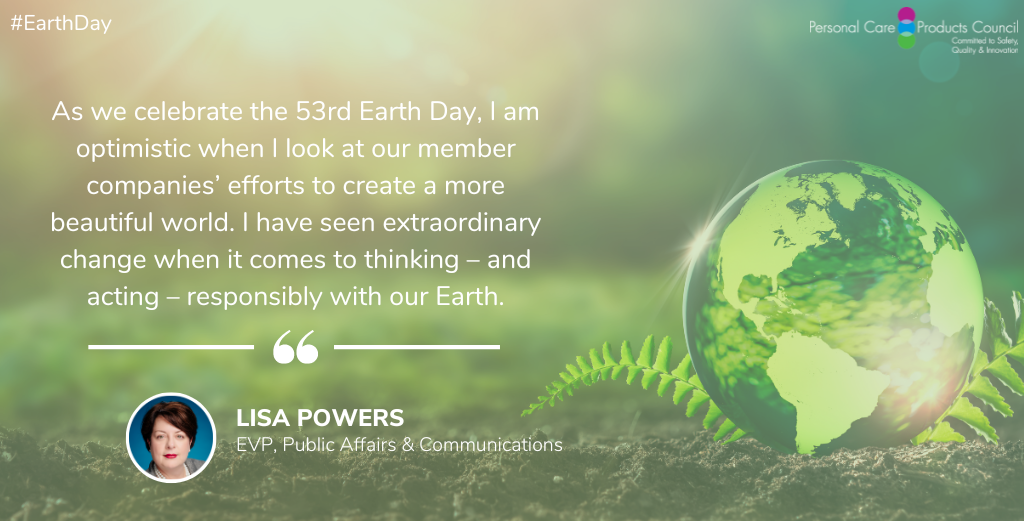Celebrating Progress on Earth Day
By Lisa Powers
Executive Vice President, Public Affairs & Communications, PCPC
I love the TV series “Yellowstone.” The beautiful and breathtaking landscape of Montana brings me a certain peace. Its main protagonist once said: “The problem is people have stopped living with the planet and started living on it. There will come a time when Earth sheds us like dead skin and it will be our own fault.” These words have stayed with me since I first heard them.
Having worked within the beauty and personal care products industry for nearly two decades, I have seen extraordinary change when it comes to thinking – and acting – responsibly with our Earth. Twenty years ago, issues like reducing packaging, increasing transparency and traceability in the supply chain, and reducing biodiversity loss were not front and center. Today they are integral parts of both the operations and the mindset of our member companies.
PCPC’s most recent sustainability report and its companion video showcase the beauty and personal care industry’s continued commitment to the responsible management of environmental, social and corporate governance (ESG) impacts and highlights the innovative ways our member companies integrate sustainability into their business practices.
But the report tells a deeper story that gives me tremendous hope on this Earth Day. In the two years since PCPC’s first sustainability report, more and more companies are taking significant steps to increase the sustainability of their operations:
- Nearly twice as many cosmetics and personal care companies report making commitments to science-based targets (SBTs), designed to limit global warming to 1.5° C and prevent the worst impacts of climate change. The SBT Initiative requires reductions to scope 1, 2 and 3 greenhouse gas emissions.
- Nearly twice as many companies report having made commitments to 100% recyclable, reusable or compostable for all plastic packaging by 2025.
- More than twice as many companies report offering consumers retail collection or mail-in take-back programs for empty packaging.
- The number of companies reporting commitments to use 100% renewable energy and joining RE 100 has doubled. RE 100 is a global corporate renewable energy initiative that brings together hundreds of large businesses committed to 100% renewable electricity.
- Multiple companies are members of the Roundtable on Sustainable Palm Oil (RSPO) and have made commitments to zero deforestation and sourcing sustainable palm oil for their products. The RSPO was established in 2004 to promote the growth and use of sustainable palm oil products.
The progress over just two years is remarkable. Momentum continues to build in our industry and so many others. And consumers are engaged as well, seeking products that align with their own sustainability priorities. While we recognize that there’s more work to be done, the beauty and personal care products industry is committed to be part of the solution when it comes to addressing some of society’s most urgent sustainability challenges. PCPC and our member companies are working together with governments and NGOs to make meaningful change.
I am optimistic when I look at our member companies’ efforts to create a more beautiful world. As we celebrate the 53rd Earth Day, I hope everyone can continue their commitments to care for our world – in every aspect of our lives – but also let’s take a moment to celebrate the progress we are making, together.

PCPC’s 2021 Sustainability Handbook provides practical guidance for advancing a company’s sustainability practice.
